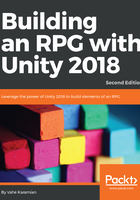
Negotiated Contest
A Negotiated Contest provides a mechanical means to resolve disputes where the set of inputs and possible outcomes is negotiated by the player and non-player characters specifically for the conflict.
Designing and developing a Negotiated Contest mechanism is pretty complex. In order for the pattern to work properly, you will need to consider all of the inputs and outputs of the negotiations. The challenge of developing such a system is not so much the actual technical implementation, but the database that you will have to create and retain, based on the available selection by the player and the outcome of each input.
The implementation of the mechanics can be as simple as a few options and outcomes, and as complex as a variety of options and their eventual outcomes down the line. The important point is that you will have to introduce a negotiation mechanism after a conflict has been introduced, but before any action has been taken! The outcome is obviously what a win/lose concerns with, based on the negotiation before the conflict.
Use the Negotiates Contest pattern when your design goals include one of more of the following:
- A desire to unambiguously decide whether the outcome of a contest means a player wins or loses his stated goals, rather than whether or not his character succeeds in performing discrete actions
- A need to scale the resolution of contests to levels of granularity different than that of individual actions
- A willingness to allow players a great deal of narrative freedom in describing the results of contests, both good and bad
For computer role-playing games, the negotiated contest will have some restrictions, as we cannot afford to create an AI system to be open-ended. But we can design a simpler means to provide the player a sense of some control on the negotiations, as part of the game play.
Negotiation can be a great mechanics for exchanging information, and good with non-player characters in your role-playing game. There are three parts to a Negotiation pattern, as follows:
- Initiation: This is the phase at which a character action is introduced into the game world
- Execution: This is the phase in which the success or failure of a character action is determined
- Effect: This is the phase in which the results of a character's actions are determined.
Here are some questions to consider when designing a Negotiation system:
- What does the winner get?
- What does the loser get?
- How do we know who's the winner and who's the loser?
- What do we need to establish before resolution begins, and how?